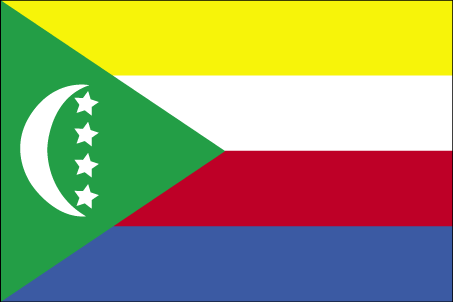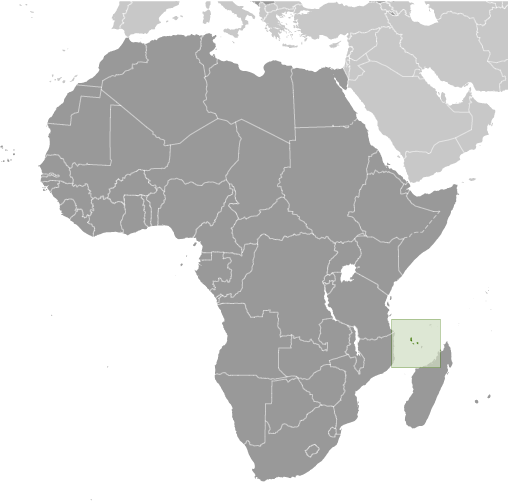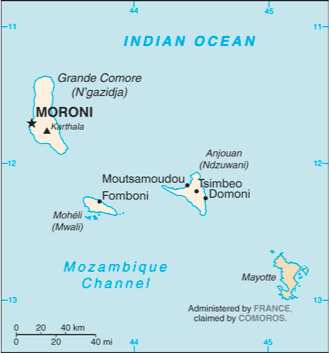Comoros has endured more than 20 coups or attempted coups since gaining independence from France in 1975. In 1997, the islands of Anjouan and Moheli declared independence from Comoros. In 1999, military chief Col. AZALI seized power in a bloodless coup, and helped negotiate the 2000 Fomboni Accords power-sharing agreement in which the federal presidency rotates among the three islands, and each island maintains its own local government. AZALI won the 2002 presidential election, and each island in the archipelago elected its own president. AZALI stepped down in 2006 and President SAMBI was elected to office. In 2007, Mohamed BACAR effected Anjouan's de-facto secession from the Union, refusing to step down in favor of fresh Anjouanais elections when Comoros' other islands held legitimate elections in July. The African Union (AU) initially attempted to resolve the political crisis by applying sanctions and a naval blockade on Anjouan, but in March 2008, AU and Comoran soldiers seized the island. The move was generally welcomed by the island's inhabitants.
Country Name
Conventional long form:Union of the Comoros
Conventional short form:Comoros
Local long form:Udzima wa Komori (Comorian); Union des Comores (French); Jumhuriyat al Qamar al Muttahidah (Arabic)
Local short form:Komori (Comorian); Comores (French); Juzur al Qamar (Arabic)
Government Type
republic
Capital
Name:Moroni
Geographic coordinates: 11 42 S, 43 14 E
Time difference:UTC+3 (8 hours ahead of Washington, DC during Standard Time)
Administrative divisions
3 islands and 4 municipalities*; Grande Comore (N'gazidja), Anjouan (Ndzuwani), Domoni*, Fomboni*, Moheli (Mwali), Moroni*, Moutsamoudou*
Independence
6 July 1975 (from France)
National Holiday
Independence Day, 6 July (1975)
Constitution
23 December 2001
Legal system
French and Islamic law in a new consolidated code; has not accepted compulsory ICJ jurisdiction
Suffrage
18 years of age; universal
Executive branch
Chief of state:President Ahmed Abdallah SAMBI (since 26 May 2006)
Head of government:President Ahmed Abdallah SAMBI (since 26 May 2006)
Cabinet:Council of Ministers appointed by the president
(For more information visit the World Leaders website)
Elections:as defined by the 2001 constitution, the presidency rotates every four years among the elected presidents from the three main islands in the Union; election last held on 14 May 2006 (next to be held in 2011)
Election results:Ahmed Abdallah SAMBI elected president; percent of vote - Ahmed Abdallah SAMBI 58.0%, Ibrahim HALIDI 28.3%, Mohamed DJAANFAMI 13.7%
Legislative branch
unicameral Assembly of the Union (33 seats; 15 deputies are selected by the individual islands' local assemblies and 18 by universal suffrage to serve for five years);
note: on rare occasions the government may convene a Loya Jirga (Grand Council) on issues of independence, national sovereignty, and territorial integrity; it can amend the provisions of the constitution and prosecute the president; it is made up of members of the National Assembly and chairpersons of the provincial and district councils
Elections: last held on 6 and 20 December 2009 (next to be held in 2014)
Election results:percent of vote by party - NA; seats by party - pro-union coalition 19, autonomous coalition 4, independents 1; note - 9 additional seats are filled by deputies from local island assemblies
Judicial branch
Supreme Court or Cour Supremes (two members appointed by the president, two members elected by the Federal Assembly, one elected by the Council of each island, and others are former presidents of the republic)
Political Parties and Leaders
Camp of the Autonomous Islands or CdIA (a coalition of parties organized by the islands' presidents in opposition to the Union President); Convention for the Renewal of the Comoros or CRC [AZALI Assowmani]; Front National pour la Justice or FNJ [Ahmed RACHID] (Islamic party in opposition); Mouvement pour la Democratie et le Progress or MDP-NGDC [Abbas DJOUSSOUF]; Parti Comorien pour la Democratie et le Progress or PCDP [Ali MROUDJAE]; Rassemblement National pour le Development or RND [Omar TAMOU, Abdoulhamid AFFRAITANE]
Political pressure groups and leaders
Other:environmentalists
International organization participation
ACCT, ACP, AfDB, AMF, AOSIS, AU, COMESA, FAO, FZ, G-77, IBRD, ICAO, ICCt, ICRM, IDA, IDB, IFAD, IFC, IFRCS, ILO, IMF, IMO, IMSO, InOC, Interpol, IOC, IPU, ITSO, ITU, ITUC, LAS, NAM, OIC, OIF, OPCW, UN, UNCTAD, UNESCO, UNIDO, UPU, WCO, WFTU, WHO, WIPO, WMO, WTO (observer)
Diplomatic representation in the US
Chief of mission: Representative to the UN and Ambassador to the US Mohamed TOIHIRI
Chancery:Mission to the US, 866 United Nations Plaza, Suite 418, New York, NY 10017
Telephone:[1] (212) 750-1637
Diplomatic representation from the US
the US does not have an embassy in Comoros; the ambassador to Madagascar is accredited to Comoros
Flag description
four equal horizontal bands of yellow (top), white, red, and blue, with a green isosceles triangle based on the hoist; centered within the triangle is a white crescent with the convex side facing the hoist and four white, five-pointed stars placed vertically in a line between the points of the crescent; the horizontal bands and the four stars represent the four main islands of the archipelago - Mwali, N'gazidja, Nzwani, and Mahore (Mayotte - territorial collectivity of France, but claimed by Comoros)
note: the crescent, stars, and color green are traditional symbols of Islam










